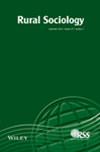The Urban–Rural Digital Divide in Internet Access and Online Activities During the COVID‐19 Pandemic
IF 1.9
3区 社会学
Q2 SOCIOLOGY
引用次数: 0
Abstract
The COVID‐19 pandemic rapidly shifted traditionally in‐person interactions to online. Because rural residents historically have lower rates of broadband internet access, they may have been less likely to conduct activities online than their urban counterparts, reflecting geographic digital inequalities. We examine whether residents of rural areas are less likely than residents of urban areas to have internet access, conduct various activities online, and use videoconferencing software during the COVID‐19 pandemic using a probability survey of Nebraskans conducted in late 2020. We find that rural residents were less likely to have broadband internet access, a pattern that persists after accounting for characteristics of the residents. We also find that rural residents were less likely than their more urban counterparts to order food and groceries online, to stream movies or TV, or to use video conferencing for work and medical care, reflecting likely infrastructure differences in rural areas. Rural residents were also less likely to engage in online education activities, play games online, use social media, or use video conferencing to stay in touch with friends and family, but these geographic differences were explained by resident characteristics, suggesting that these differences in behaviors may be due to preference rather than lacking infrastructure.COVID - 19大流行期间互联网接入和在线活动的城乡数字鸿沟
COVID - 19大流行迅速将传统的面对面互动转变为在线互动。由于农村居民的宽带互联网接入率历来较低,他们可能比城市居民更不可能在网上开展活动,这反映了地理上的数字不平等。我们通过2020年底对内布拉斯加州进行的概率调查,研究了在COVID - 19大流行期间,农村地区的居民是否比城市地区的居民更不可能上网、开展各种在线活动和使用视频会议软件。我们发现,农村居民不太可能拥有宽带互联网接入,这一模式在考虑了居民的特征后仍然存在。我们还发现,与城市居民相比,农村居民更不可能在网上订购食品和杂货,观看流媒体电影或电视,或者在工作和医疗中使用视频会议,这反映了农村地区可能存在的基础设施差异。农村居民也不太可能参与在线教育活动、玩在线游戏、使用社交媒体或使用视频会议与朋友和家人保持联系,但这些地理差异可以用居民特征来解释,这表明这些行为差异可能是由于偏好而不是缺乏基础设施。
本文章由计算机程序翻译,如有差异,请以英文原文为准。
求助全文
约1分钟内获得全文
求助全文
来源期刊

RURAL SOCIOLOGY
SOCIOLOGY-
CiteScore
4.60
自引率
13.00%
发文量
47
期刊介绍:
A forum for cutting-edge research, Rural Sociology explores sociological and interdisciplinary approaches to emerging social issues and new approaches to recurring social issues affecting rural people and places. The journal is particularly interested in advancing sociological theory and welcomes the use of a wide range of social science methodologies. Manuscripts that use a sociological perspective to address the effects of local and global systems on rural people and places, rural community revitalization, rural demographic changes, rural poverty, natural resource allocations, the environment, food and agricultural systems, and related topics from all regions of the world are welcome. Rural Sociology also accepts papers that significantly advance the measurement of key sociological concepts or provide well-documented critical analysis of one or more theories as these measures and analyses are related to rural sociology.
 求助内容:
求助内容: 应助结果提醒方式:
应助结果提醒方式:


